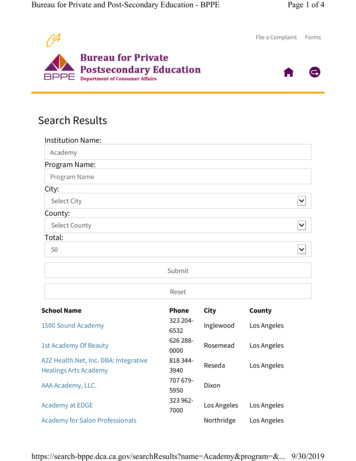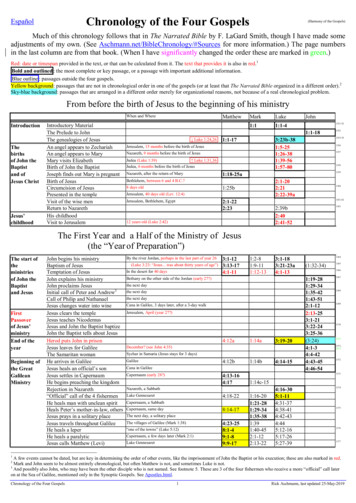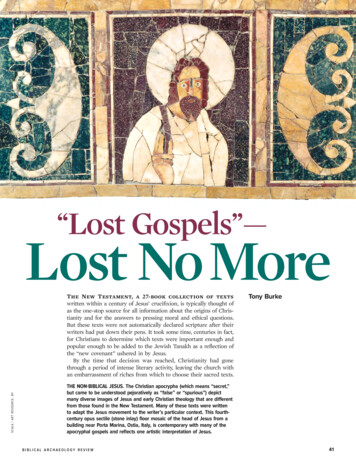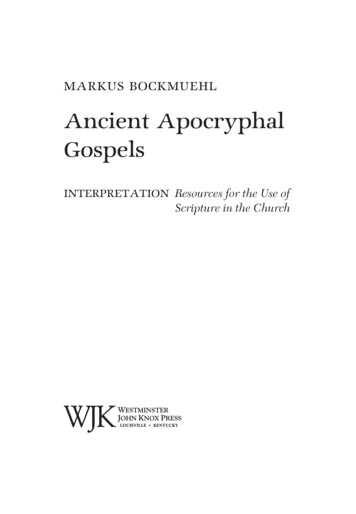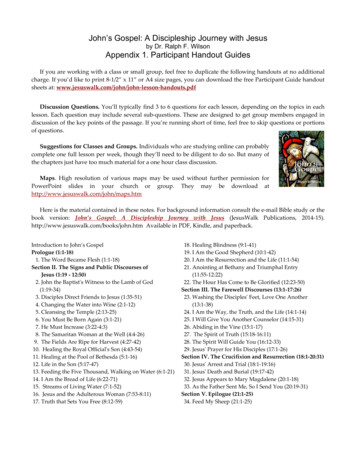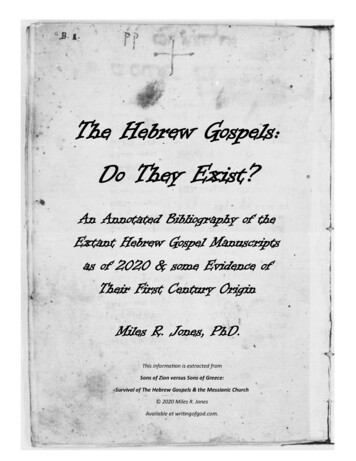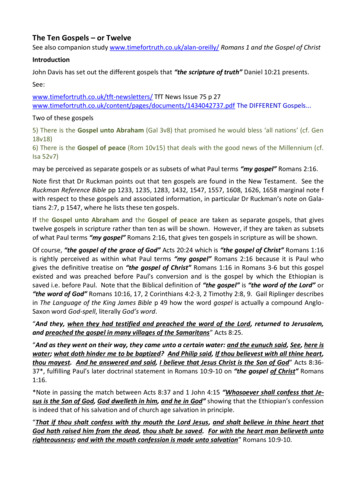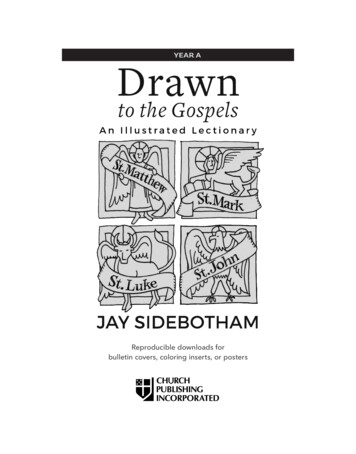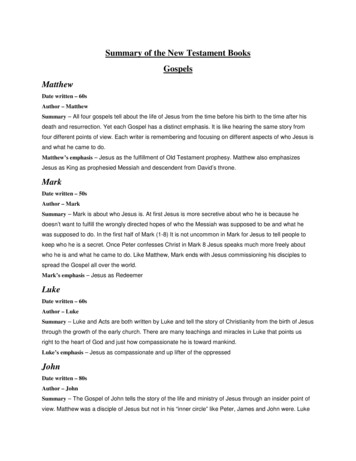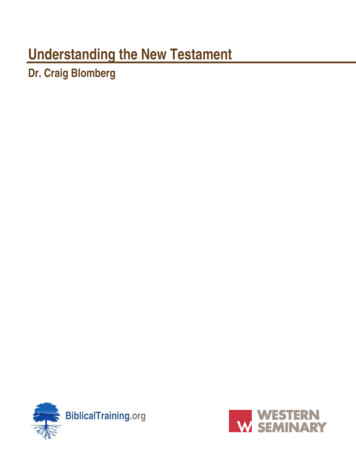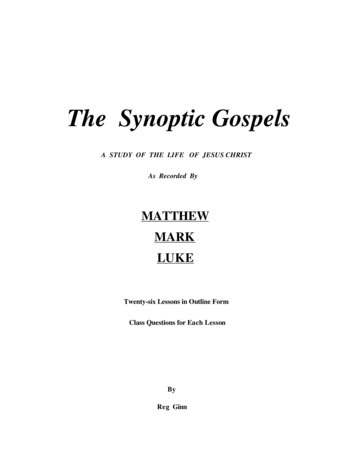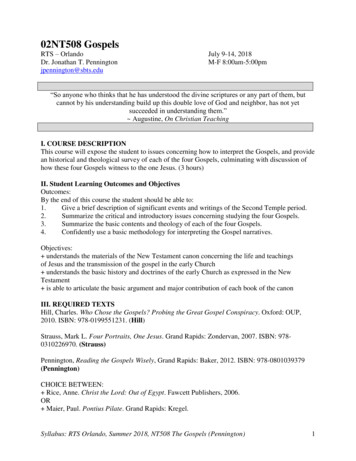
Transcription
02NT508 GospelsRTS – OrlandoDr. Jonathan T. Penningtonjpennington@sbts.eduJuly 9-14, 2018M-F 8:00am-5:00pm“So anyone who thinks that he has understood the divine scriptures or any part of them, butcannot by his understanding build up this double love of God and neighbor, has not yetsucceeded in understanding them.” Augustine, On Christian TeachingI. COURSE DESCRIPTIONThis course will expose the student to issues concerning how to interpret the Gospels, and providean historical and theological survey of each of the four Gospels, culminating with discussion ofhow these four Gospels witness to the one Jesus. (3 hours)II. Student Learning Outcomes and ObjectivesOutcomes:By the end of this course the student should be able to:1.Give a brief description of significant events and writings of the Second Temple period.2.Summarize the critical and introductory issues concerning studying the four Gospels.3.Summarize the basic contents and theology of each of the four Gospels.4.Confidently use a basic methodology for interpreting the Gospel narratives.Objectives: understands the materials of the New Testament canon concerning the life and teachingsof Jesus and the transmission of the gospel in the early Church understands the basic history and doctrines of the early Church as expressed in the NewTestament is able to articulate the basic argument and major contribution of each book of the canonIII. REQUIRED TEXTSHill, Charles. Who Chose the Gospels? Probing the Great Gospel Conspiracy. Oxford: OUP,2010. ISBN: 978-0199551231. (Hill)Strauss, Mark L. Four Portraits, One Jesus. Grand Rapids: Zondervan, 2007. ISBN: 9780310226970. (Strauss)Pennington, Reading the Gospels Wisely, Grand Rapids: Baker, 2012. ISBN: 978-0801039379(Pennington)CHOICE BETWEEN: Rice, Anne. Christ the Lord: Out of Egypt. Fawcett Publishers, 2006.OR Maier, Paul. Pontius Pilate. Grand Rapids: Kregel.Syllabus: RTS Orlando, Summer 2018, NT508 The Gospels (Pennington)1
ALSO, before class on July 10, watch my video lecture on the kingdom of God ums/the-kingdom-of-god.ADDITIONAL RECOMMENDED RESOURCES:Aland, K. ed. Synopsis Quattuor Evangeliorum14. New York: UBS, 1990.orAland, K., ed. Synopsis of the Four Gospels10. New York: UBS, 1987. (Greek-English paralleltext, but lacks extra-Biblical parallels and more expensive!!)Green, Joel, ed., Dictionary of Jesus and the Gospels, 2d ed. Downers Grove, IL: IVP, 2013.IV. LEARNING ASSESSMENT1.Exams: 1 @ 100 pts each 100 points2.Reading Response (Rice/Maier) 20 points3.‘Closer Reading’ Passages: 7@20 pts 140 points320 points[Note also that points will be deducted for not completing reading. See Reading Report.]Grading Scale94% - 100% A90% - 93%A88% - 89%B 84% - 87%80% - 83%78% - 79%BBC 74% - 77%70% - 73%68% - 69%CCD 64% - 67%60% - 63%0% - 59%DDFExamA note on the final exam: The exam will be multiple choice, short answer, and essay. It will basedon three things: (1) a close reading of the textbooks; (2) knowledge of notes from the lecturesand lecture handouts; and (3) knowledge of the content of the Four Gospels.Reading Assignments There are three main textbooks for this course. All assigned readings are found on the classschedule and must be completed by the assigned class period. You are required to keep a recordof your reading and turn in the Reading Report (see last page of syllabus) on the last day of class. The third textbook is a choice between two historical novels. They are both very beneficial toread and I recommend both, but only one is required and you can choose. Anne Rice’s novelgives a first-person narration of Jesus’ life while 7-8 years old. Paul Maier’s book sits PontiusPilate and 1st century Christianity squarely in its Roman Imperial context. For whichevertextbook you choose you will need to write a 2-page response paper (see below for due date). Another important part of the reading requirements for this course is a thoughtful reading ofeach of the four Gospels in their entirety. While reading textbooks and coming to fabulouslectures are beneficial and essential for your training, they can never substitute for a careful andhumble reading of the Gospels themselves. According to the specifications of the class scheduleSyllabus: RTS Orlando, Summer 2018, NT508 The Gospels (Pennington)2
you will be required to read each of the Gospels in their entirety – preferably within one or twosettings. In conjunction with your reading of the Four Gospels in their entirety, you will also be assigned7 passages for which you will give a “closer look.” For these assigned passages you will use theCloser Reading Study Sheet found on Canvas. This includes doing a narrative analysis of the text(as explained in the lecture) and answering a few additional questions. On the day that thepassage is due, you must turn in this assignment typed out.Reading ReportThe purpose of the reading report is to ensure that students have completed the required readingfor the course. You must read the required material by the date noted in the course schedulebelow. The reading report is to be handed in on the last day of class. Persons who do not hand ina reading report will receive an “F” for the class. The form to be used for the reading report isfound at the end of the syllabus. See that form for how the reading affects your grade.V. COURSE EXPECTATIONS Class Attendance and Participation: Class attendance is essential for languagelearning. Students are expected to be in class and participate regularly. Class Preparation: For each class period students should spend sufficient time tofinish the assigned readings and prepare the assigned passage(s).Syllabus: RTS Orlando, Summer 2018, NT508 The Gospels (Pennington)3
VI. COURSE SCHEDULEStrauss Mark Strauss, Four Portraits, One JesusPennington Pennington, Reading the Gospels WiselyHill C. E. Hill, Who Chose the Gospels?Day1DateJuly 9July 9AfternoonMaterial Covered / Lecture TitleReading/Assignments DUELearning to Read WiselyIntroduction to the CourseStrauss 23-42What are the Gospels and WhyDo We Need Them?Pennington chapters 1-3Hermeneutics 501 for theGospelsPennington chapters 6-7Strauss 67-89Hill chapters 1-5Strauss 43-65Strauss 347-382The Study of the Gospels overthe CenturiesHill chapters 6-112July 10MorningThe Gospels as History and intheir Historical andRedemptive Context, Part OnePennington chapters 4-5Strauss 383-410Strauss 93-167The Gospels as History and intheir Historical andRedemptive Context, Part TwoSTL PacketsBEFORE CLASS: Watch Penningtonvideo on the ry/forums/the-kingdom-of-godHow to Read the GospelsWiselyJuly 10Afternoon34July 11MorningJuly 11AfternoonJuly 12MorningPennington chapters 8-10Pennington chapter 11Reading Matthew IntroductionDoriani chapters 7-8 (pdf)Strauss 213-258All of MatthewThe Four GospelsWalking through Matthew“Closer Reading” – Matt 4:1-11Walking through Matthew“Closer Reading” – Matt 9:1-8Walking through Matthew“Closer Reading” – Matt 17:1-8Lecture Topic: Jesus’ PassionStrauss 493-525Syllabus: RTS Orlando, Summer 2018, NT508 The Gospels (Pennington)4
July 12Afternoon5July 13MorningReading MarkWalking through MarkStrauss 171-212All of MarkLecture Topic: ParablesReading Luke“Closer Reading” – Mk 6:45-52Strauss 259-296All of LukeWalking through Luke“Closer Reading” – Lk 5:1-11July 13Afternoon6July 14MorningJuly 14AfternoonPostClassExamJuly 28,11:59pmESTLecture Topic: Eschatology inthe GospelsReading JohnStrauss 297-343All of JohnWalking through JohnWalking through John“Closer Reading” – Jn 2:13-22“Closer Reading” – Jn 20:11-18Strauss 455-468The One JesusThe One JesusStrauss 399-409, 435-454Strauss 469-491Pennington chapter 12Final Exam DUE(to be taken on Canvas)Reading Report DUEReading Response DUE (Maier orRice)Syllabus: RTS Orlando, Summer 2018, NT508 The Gospels (Pennington)5
Name:READING REPORT –The GospelsDesignate below (by checking under the appropriate category) the percentage and manner in which you fulfilled thereading assignment. Grading Scale: 3 points off your total points for the course for each item skimmed or read late. 5points off your total points for the course for each item not read. Assignments that are not read by the assignedclass period are to be marked in the “Skimmed/Late” category.WeekDay 1Read ThoughtfullySkimmed/LateDid not ReadDay 2Day 3Day 4Day 5Day 6Syllabus: RTS Orlando, Summer 2018, NT508 The Gospels (Pennington)6
Course Objectives Related to MDiv* Student Learning OutcomesCourse: 2NT508Professor: Jonathan PenningtonCampus: OrlandoDate: Summer 2018MDiv* Student Learning OutcomesIn order to measure the success of the MDiv curriculum, RTS has definedthe following as the intended outcomes of the student learning process.Each course contributes to these overall outcomes. This rubric shows thecontribution of this course to the MDiv outcomes.Rubric Mini-JustificationStrongModerateMinimalNone*As the MDiv is the core degree at RTS, the MDiv rubric will be used in this syllabus.Articulation(oral &written)Broadly understands and articulates knowledge, bothoral and written, of essential biblical, theological,historical, and cultural/global information, includingdetails, concepts, and frameworks.StrongScriptureSignificant knowledge of the original meaning ofScripture. Also, the concepts for and skill to researchfurther into the original meaning of Scripture and toapply Scripture to a variety of modern circumstances.(Includes appropriate use of original languages andhermeneutics; and integrates theological, historical,and cultural/global perspectives.)Significant knowledge of Reformed theology andpractice, with emphasis on the tes a love for the Triune God that aids thestudent’s sanctification.StrongDesire forWorldviewBurning desire to conform all of life to the Word ofGod.StrongWinsomelyReformedEmbraces a winsomely Reformed ethos. (Includes anappropriate ecumenical spirit with other Christians,especially Evangelicals; a concern to present theGospel in a God-honoring manner to non-Christians;and a truth-in-love attitude in disagreements.)ModeratePreachAbility to preach and teach the meaning of Scriptureto both heart and mind with clarity and enthusiasm.ModerateReformedTheologyMinimalFor multiple passages of Scripturestudents will complete a CloserReading assignment that requiresarticulation of their analysis of thetext.Students will gain significantknowledge of the Scriptures andhow they are best interpretedthrough lectures, reading, andwritten assignments.As issues of Reformed theologyarise they will be discussed,including epistemological andsoteriological matters from aReformed perspective.All written assignments have thestated goal of personal, heart-levelapplication. Lectures and classdiscussion will regularly engagewith personal application of thetexts.Focusing on the Gospels providesgreat opportunity for personaldevelopment and applicationcentered in Holy Scripture.This approach of winsomelyReformed is a large part of myoverall strategy and goal inteaching. The study of the historyof interpretation especially willenable a humble appreciation ofmultiple views in the Church, whilemaintaining a Reformedperspective.Questions of how to teach andpreach the Gospels will bediscussed regularly in class. CloserReading assignments include adiscussion of the application of the
WorshipKnowledgeable of historic and modern Christianworship forms; and ability to construct and skill tolead a worship service.MinimalShepherdAbility to shepherd the local congregation: aiding inspiritual maturity; promoting use of gifts and callings;and encouraging a concern for non-Christians, bothin America and worldwide.MinimalChurch/WorldAbility to interact within a denominational context,within the broader worldwide church, and withsignificant public issues.MinimalGospel texts.There will be some in-classdiscussion about how the Gospelswere used in worship in the ancientchurch.Some shepherding issues will arisein the course of our biblical studyand will be addressed whenappropriate.At times the discussion of theGospels will be put into the contextof the life of the church today.
Gospels Strauss 23-42 Pennington chapters 1-3 Pennington chapters 6-7 Strauss 67-89 Hill chapters 1-5 July 9 Afternoon The Study of the Gospels over the Centuries The Gospels as History and in their Historical and Redemptive Context, Part One Strauss 43-65 Strauss 347-382 Hill chapters 6-11
